The COVID pandemic will eventually pass away, but the enormous societal changes that it has caused are around to stay. We have learned to work and study from home, and we have appreciated the benefits of such a lifestyle.
But positive changes always come with challenges.
Self-motivation, discipline, deadlines, and lack of communication are some of the forces that undermine our productivity at home.
This article is a comprehensive guide to working efficiently and happily from home. You’ll learn how to:
- stay focused
- structure your workflow
- arrange your space
- find your work-life balance
- motivate yourself
These five areas come with 25 pieces of priceless advice. Which ones will work for you?
🎯 4 Tips to Stay Focused
How can students be productive at home with no one to control them? Distractions attack us from all directions, and when we deal with one of them, another inevitably emerges. There are many ways to concentrate if you use your self-discipline to follow them through.
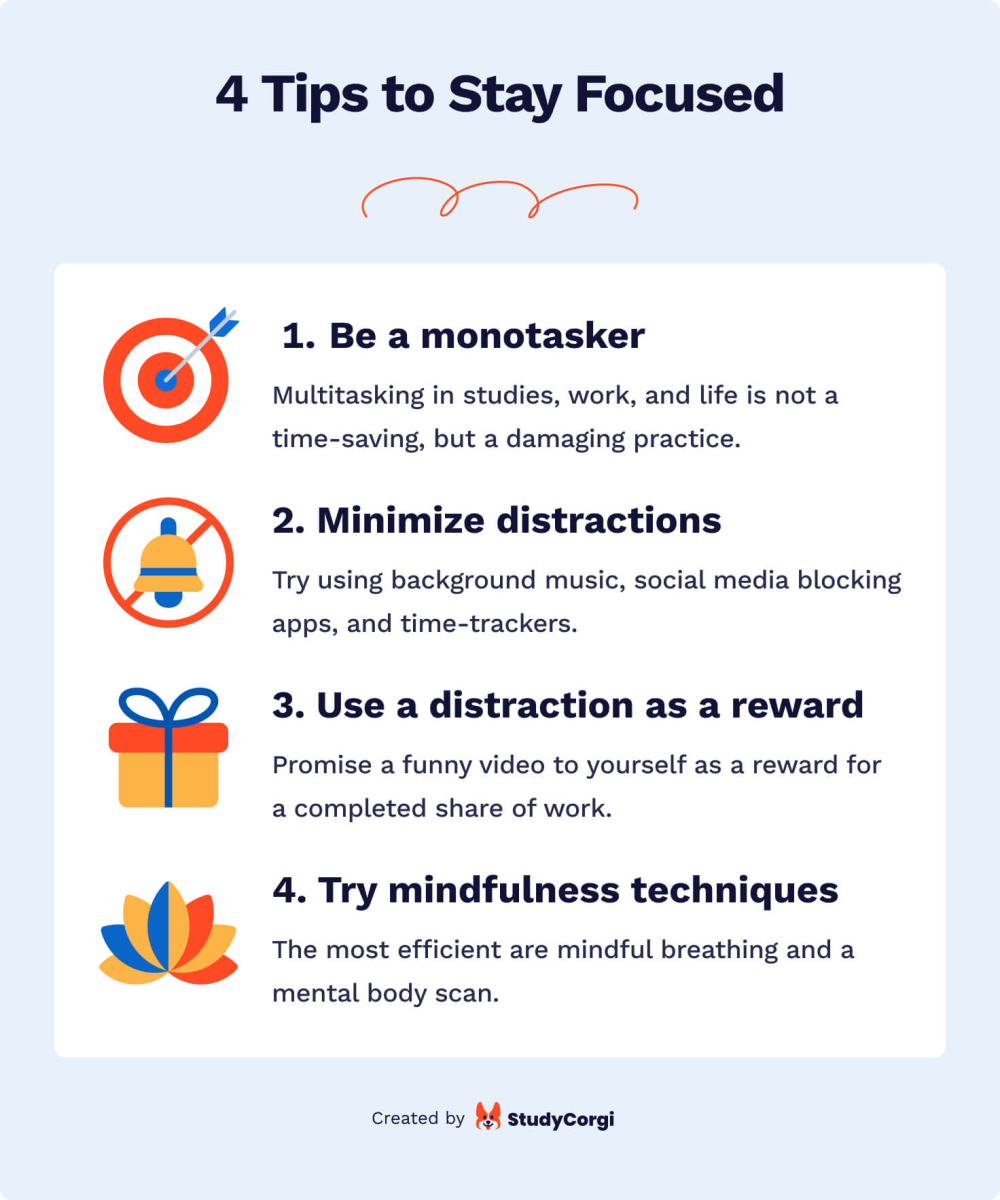
Tip #1: Be a Monotasker
In times of distance education and working from home, multitasking becomes more tempting than ever. Why not check your email while eating breakfast? Why not do the laundry while listening to that voice mail? Although these two examples are minor and avoidable, other cases are inevitable. For instance, you won’t find a quiet escape from your kids at your home office.
However we look at it, multitasking in your studies, work, and life is a damaging practice.
Researchers at the University of Utah have found that as little as 2.5% of the population can multitask without compromising efficiency. The research analyzed dual-task conditions. And how many of us regularly engage in triple-tasking?
Another study demonstrated that task alteration entails switching time costs that increase according to the tasks’ complexity. Moreover, our brain is more prone to making mistakes when switching between tasks that require active attention. Multitasking does not save you time, no matter how you look at it.
Tip #2: Minimize Distractions
Cal Newport introduced the notion of deep work in his famous book.
Deep work denotes our ability to focus on a demanding task without distraction. This skill is a powerful time-saver that will make you better at any activity you choose and grant you a sense of fulfillment from craftsmanship.
However, most people prefer to spend their days intermingling short periods of productivity with social media, naps, and minor chores.
So, when the fridge is so close, and the boss is so far away, try using the concentration techniques below.
Tip #3: Use a Distraction as a Reward
If a funny cat video or checking on your crush on Facebook is too tempting, promise it to yourself as a reward for a completed share of work. But don’t forget to fix the exact time you can spend indulging in those inefficient activities.
Tip #4: Try Mindfulness Techniques
How can you concentrate on your studies when there are so many other exciting things around? Mindfulness is a strategy to stay in the moment and protect yourself from emotional overload. It has multiple techniques (available in the infographic referred to above), but the most efficient are:
- Mindful breathing is a type of meditation. Observe how you inhale and exhale to practice focusing and de-clutter your mind.
- A mental body scan aims to spot tension in your body and release it. Notice the emotions that emerge in the process.
✅ 6 Tips to Structure Your Workflow
We have 6 answers to the question, “How can I stay focused while working from home?” All of them focus on self-organization and time management. As a result, you will feel less stressed and able to get more things done.
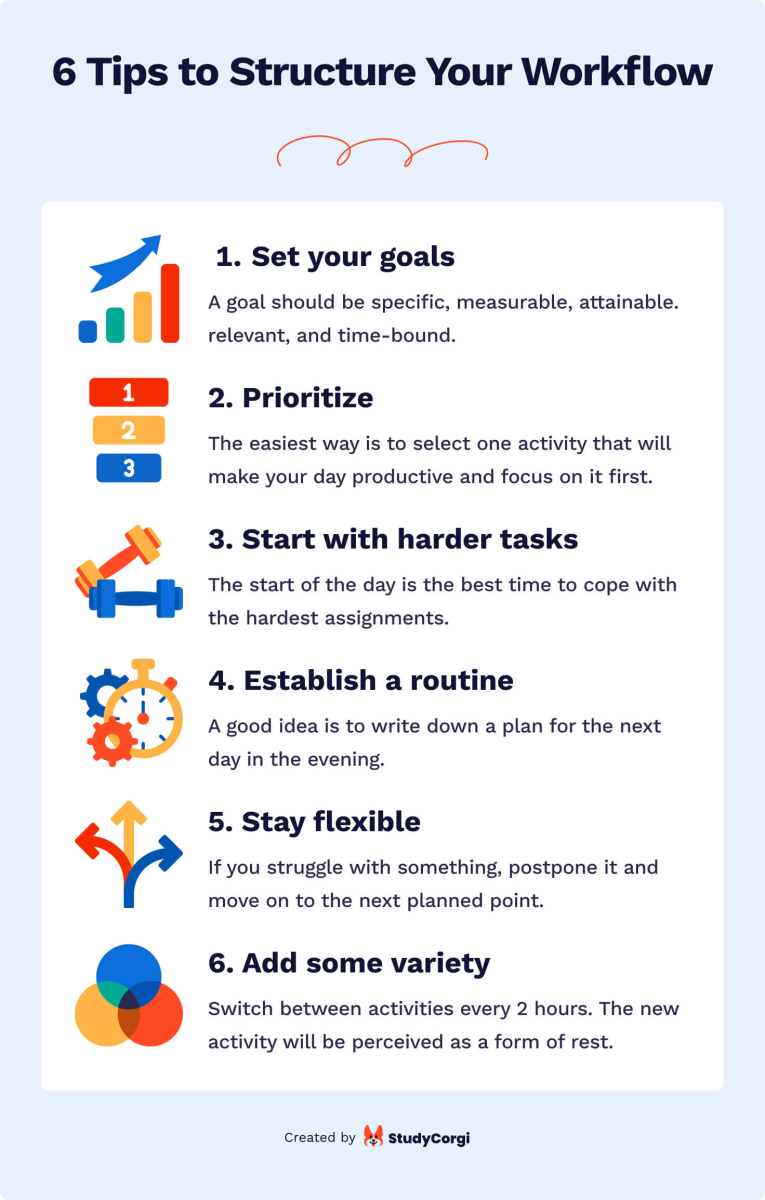
Tip #5: Set Your Goals
Do you remember why you want to be productive in the first place? Most of the time, effort for effort’s sake alone doesn’t work. It helps to have short- and long-term goals to stay motivated and develop healthy work habits.
Imagine your ideal future and think of the steps you’ll need to make it real. The SMART principle can help you with that task. The goals should be:
- Specific (“learn French,” not “learn a foreign language”);
- Measurable (“get to an intermediate level”);
- Attainable (“learn ten words per day,” not “speak like a native speaker in 10 years”);
- Relevant (“I need to learn French because…”)
- Time-bound (“What do I plan to achieve in a week, month, and year?”)
Tip #6: Prioritize
Some people fall into the trap of setting too many goals and drifting between them without getting anything done. We suggest 2 prioritizing strategies:
The most famous: The Eisenhower Matrix
This method teaches you to focus on essential and urgent tasks, skipping or delegating the remaining ones. Specifically, divide all your activities into 4 categories.
The simplest: Select one activity to complete by which you’ll consider your day productive. This method works well for people who feel stressed or burn-out. Besides, newbies in time management will also appreciate its manageability.
Tip #7: Start with Harder Tasks
When you sit down to work, fresh and enthusiastic, you have a high energy level.
The start of your working day the best time to cope with the most challenging assignments.
By the time you complete them, you could feel exhausted. That is time to cope with routine activities that don’t require much attention or mental effort. If you tackle your to-do list the other way around, you’ll always be too tired to manage the tricky things.
However, this strategy doesn’t work for everyone. Start with the most straightforward assignments when you feel depressed or don’t have enough energy. Gradually, you’ll become more involved, and the challenging tasks won’t seem as daunting anymore.
Tip #8: Establish a Routine
Routines and timetables become especially helpful in terms of how to be productive at home for students. When nobody controls your progress and the deadline is the only motivator, work or studies can easily turn into an infinite series of procrastination.
In the evening, write down a plan for the next day and follow it as much as possible.
However, a simple checklist won’t suffice. Start with a resolution to wake up and go to bed at the same time every day. Then put self-development tasks on the schedule. For instance, practicing a sport, learning a foreign language, or developing cooking skills. These activities diversify your life.
Tip #9: Stay Flexible
Meanwhile, don’t go to ridiculous lengths in your planning aspirations.
If you struggle with something on the schedule, postpone it and move on to the next planned point.
Make a workout break or take a breath of fresh air. You’ll return with a refreshed mind and body. Besides, such a time-out is helpful with creative tasks, as breakthrough thoughts tend to visit us when we least expect them.
Tip #10: Add Some Variety
Work or studies from home can quickly become a horse mill. Did you know that you can trick your body and mind by switching between different activities every two hours?
The new activity will be perceived as a form of rest.
Try the same approach with some of the tools mentioned above. For instance, combine the Pomodoro (25 minutes) and Timely techniques (90 minutes).
🗂️ 4 Tips to Organize Your Space
How can you study effectively at home and cut the distractions to a minimum? Below, you’ll find 4 tips on arranging a comfortable, functional, and cozy workplace.
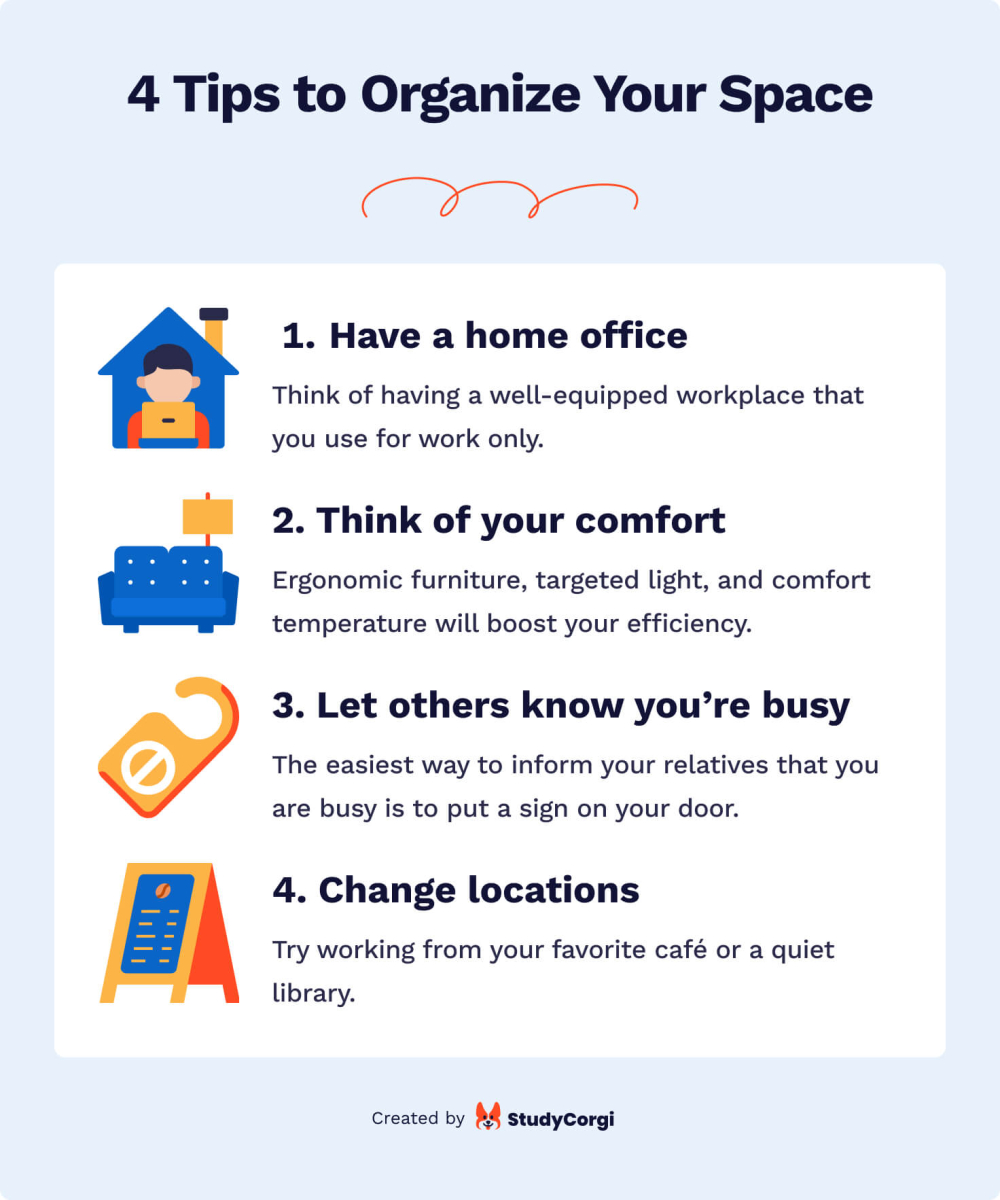
Tip #11: Have a Home Office
Having a well-equipped workplace, which is not a kitchen table or a desk for the children in your family, is an enormous benefit. If you have to clean up the space every time you need to do homework, you will soon start to hate even the thought of your studies.
Tip #12: Think of Your Comfort
We are all so different, but when it comes to comfort, we usually think of the same things:
- Lighting
The light should be sufficient and targeted. A small table lamp is better than a powerful ceiling light. Nobody illuminates the entire theater hall during a play if they want the viewers to focus on the stage. Your desk functions in the same way. - Air temperature and humidity
These factors are too subjective to comment in depth here, but a good heating or air conditioning unit can make your education more pleasant. - No clutter
Put away the books after each studying session, not before it. You’ll quickly develop the habit, and always having a neat workplace at hand will inspire you to sit down there more often. - Pleasant color scale
Psychology says we react to some colors better than others. For instance, yellow and orange boost our creativity, and blue enhances concentration. - Ergonomic furniture
This is the most decisive factor. If your back hurts after half an hour of sitting down to work, change the chair.
This infographic offers more tips on arranging a comfortable study space.
Tip #13: Let Others Know You’re Studying or Working
The easiest way to inform your relatives that you are busy is to put a sign on your door. If there are young siblings who can’t read yet, the best solution is to lock the door. Unfortunately, we cannot recommend the same thing for parents who work from home.
Tip #14: Change Locations
When nothing helps, and you are approaching burnout, you need to change the space altogether. Try working from your favorite café or a quiet library. The same advice applies to those with larger families who don’t have a personal space to focus and get in a “flow state.”
🏄 6 Tips to Keep Work-Life Balance
It is sad to admit, but in the struggle to balance work and life, most of us end up ruining both. But if we learn from our mistakes, we’ll see that the following 6 recommendations do work.
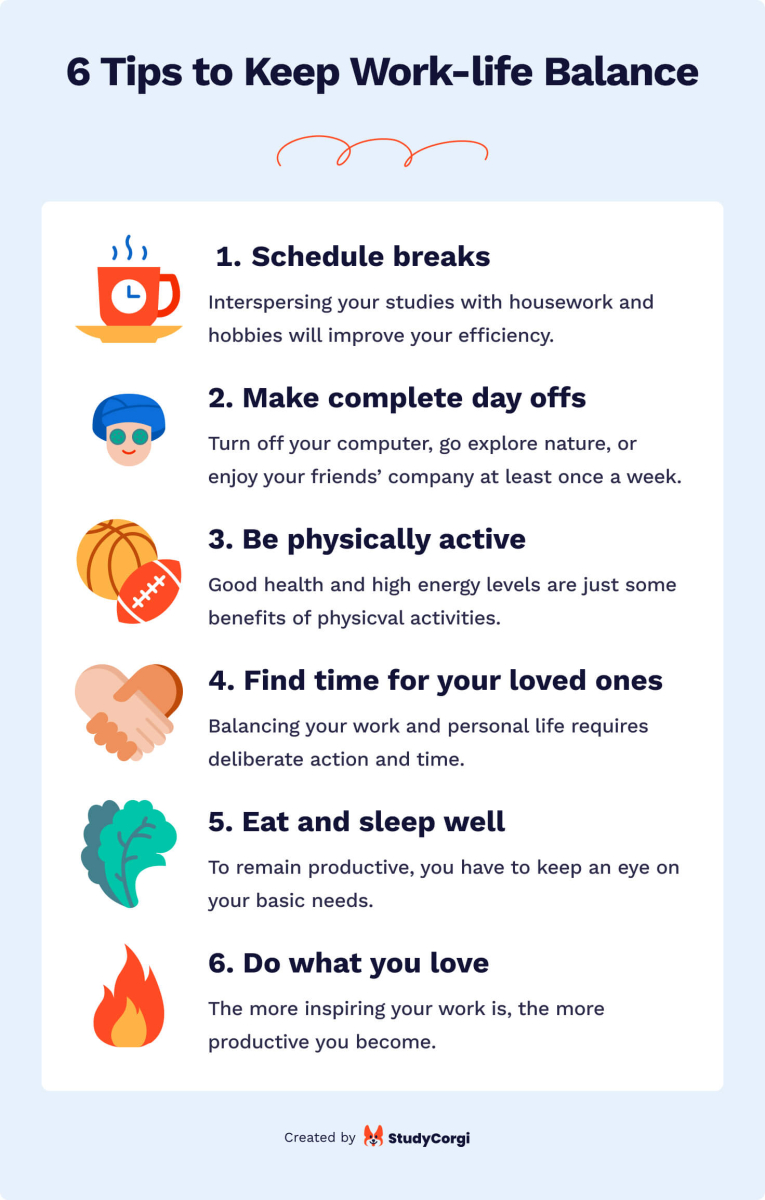
Tip #15: Schedule Breaks
You may long to lay down and watch the shadows of trees flicker across the ceiling. But admit it, this isn’t very efficient.
Intersperse your work or studies with housework, sports, or hobbies. You’ll notice how much more you’ll have done by the end of the day.
Besides, the Deep Work strategy described above suggests using any repetitive tasks as a time to work on concepts. For example, a writer can think of a plot twist, and a student can brainstorm arguments for an essay while doing the laundry. As a bonus, you won’t feel like you’re wasting your time while coping with domestic chores.
Tip #16: Make Complete Day Offs
However efficient you would like to be, everyone needs a day off to recharge. Once a week is enough (and most likely, you won’t manage to afford more).
Turn off your computer, go explore nature, or enjoy your friends’ company.
If possible, mute all work chats to avoid thinking of routine problems, and make the most of this day.
Tip #17: Be Physically Active
Physical activities are beneficial in many ways. Good health and high energy levels are just some benefits.
Sports help us develop self-confidence, self-esteem, leadership, and social skills vital in all the other spheres of life.
Besides that, you will grow your discipline, brainpower, passion, and emotional management.
And for those who would like to incorporate sports into their everyday reality, look through these recommendations for college students.
Tip #18: Find Time for Your Loved Ones
Your job or studies are critical, but your life consists of much more. You had a life before accepting this job opportunity or starting classes at college, and one day you’ll find another job or graduate from college.
But the people you love will stay.
Balancing your work and personal life requires deliberate action and time.
Tip #19: Eat & Sleep Well
To remain productive, you have to keep an eye on your basic needs.
- Make sure you have enough uninterrupted hours of rest without checking your email and messages. Home offices don’t have fixed working hours. Thus, we gradually lose the line between work, studies, and free time. American Academy of Sleep Medicine insists on at least seven continuous hours of sleep every night. It helps to put away your smartphone at least 20 minutes before bed.
- Eat nutritious and diverse products and don’t skimp time on cooking. Ramen and fast-food burgers are not good choices for your body or brain. Research has shown that our diet affects our cognitive abilities. And our brain is an essential tool for most work-from-home people. In this article, you can find some advice on what to eat if you are extremely busy.
Tip #20: Do What You Love
The more inspiring your work is, the more productive you become. And vice versa, if you hate what you do, it will be difficult to succeed in it. How to know which side you’re on? Imagine you were offered unpaid or charitable fieldwork in your sphere of knowledge. Would you feel enthusiastic or at least consider dedicating your time to the effort? If yes, congratulations! You are one of the lucky ones whose work is also your hobby.
🌟 5 Tips to Stay Motivated
How often have you dreamt of working from home before it became your everyday reality? Didn’t you think your commute time could be used more efficiently? Unfortunately, most of us demonstrate lower productivity at home than at the office or college. Lack of face-to-face communication with like-minded people has a negative effect. Here’s how you can motivate yourself to stop procrastinating.
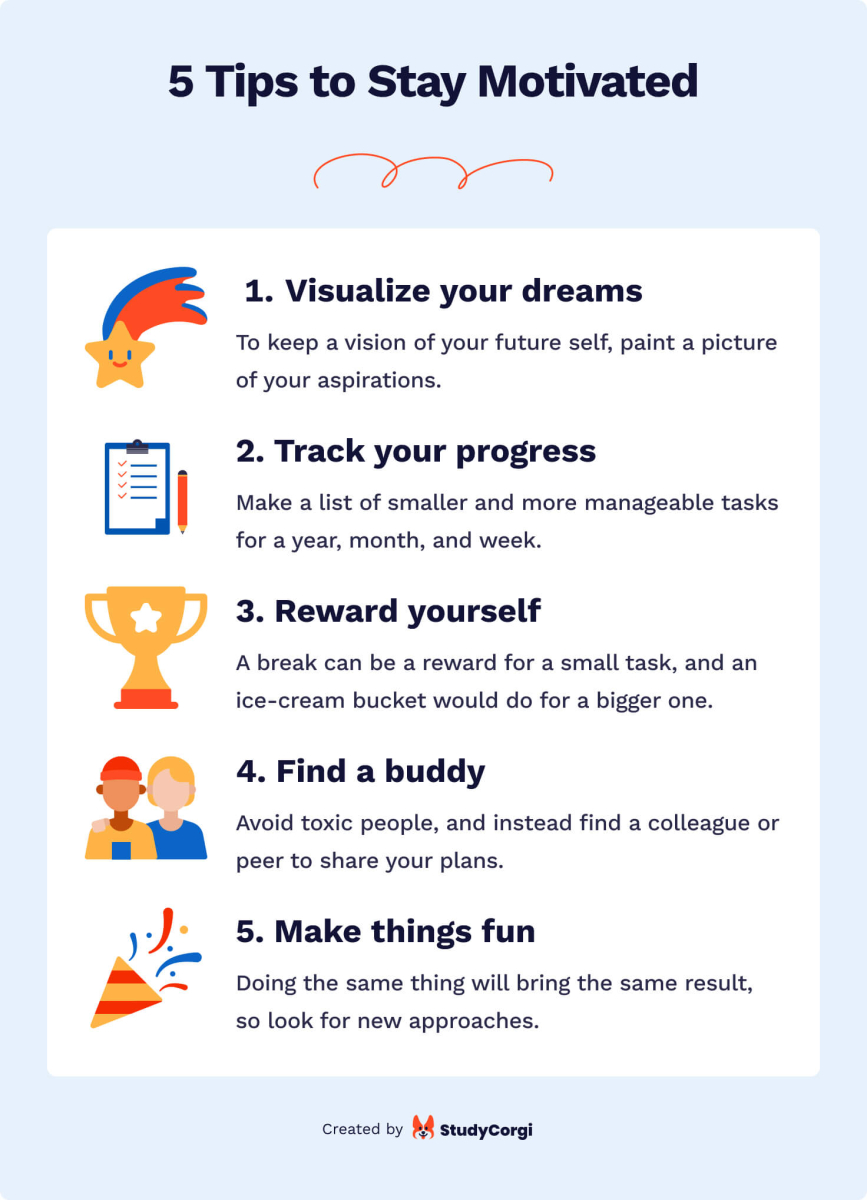
Tip #21: Visualize Your Dreams
In a work-from-home routine, it is very natural to forget why you chose this occupation in the first place and what you live for in general.
To keep a vision of your future self, paint a picture of your aspirations.
Build on your emotions and spontaneity but don’t forget about your actual intentions. The purpose is not aesthetic value but accuracy. You can use whatever your imagination allows:
- Quotes
- Affirmations and other words
- Doodles
- Photos
- Souvenirs
- Tickets
Besides, it´s a great way to decorate a home office and make it sweet and cozy.
Tip #22: Track Your Progress
The board we mentioned above visualizes your goals, but how do you know when you’ve achieved them?
Every long trip consists of lots of small steps.
Make a list of smaller and more manageable tasks for a year, month, and week. Every Sunday, sit down and check how you’ve coped with the tasks for the past week. Write down what you plan to do next. Then, do the same thing at the end of the month and year.
Tip #23: Reward Yourself
Once you’ve divided the bulk of work into smaller chunks, think of how you could reward yourself for completing them.
Be sure to make the prize proportional to the work.
A ten-minute break can be a reward for a small task, and an ice-cream bucket would do for a bigger one.
Tip #24: Find a Buddy
Your surroundings can either motivate you or drain the last drops of your inspiration, depending on your relationships. Avoid toxic people, and instead find a colleague or peer to share your plans. Such buddies can give you that decisive kick in the pants when needed.
Tip #25: Make Things Fun
To paraphrase Einstein’s quote, you cannot resolve a problem from the point where it emerged. Doing the same thing will bring the same result, so look for new approaches. For instance, arrange an online homework marathon or compete with your study buddy in how quickly you can resolve a math task.
If you are a research student, dream of how your hypothesis can improve the life of humanity.
There’s always a place for creativity, particularly when you work at home without onlookers. Even dressing up can sometimes boost your productivity.
Our advice on being productive at home for students may seem obvious, but a thorough, structured approach can work miracles. Try this working “diet” at least for a week and see how much free time you have. Don’t forget to share your impressions and accomplishments with us once you succeed. Thousands of our readers will find inspiration in the story of how you beat procrastination.
